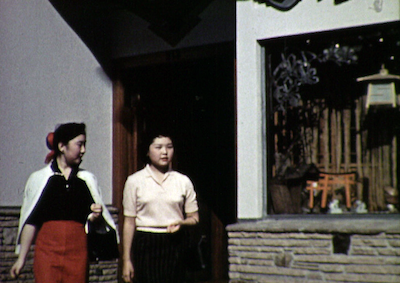This program showcases a selection of short 16mm films from the 1950s to the 1970s that engage with ideas about race, identity and community outside of mainstream theatrical cinema. The films discussed in the collection of essays that inspired this program, Screening Race in American Nontheatrical Film (Duke University Press, 2019), include educational films, home movies, industry and government films, student films, anthropological films and church films. This 16mm program includes one of the earliest known film representations of a Japanese American cultural movement in the post–World War II era, a student film about undocumented Mexican workers in a church sewing operation in downtown Los Angeles, and a moving portrait of a young African American high schooler living in Watts on the cusp of the 1965 Rebellion. These films portrayed the lives of those who were mostly excluded from the commercial films being produced in Hollywood. The films will be presented by Marsha Gordon and Allyson Nadia Field, co-editors of Screening Race. A book signing will precede the screening at 6:30 p.m. in the lobby of the Billy Wilder Theater.
Program curation and notes by Marsha Gordon and Allyson Nadia Field.
The Challenge (1957)
As Dino Everett and Todd Kushigemachi discuss in their essay, this USC student film touches upon crucial issues of culture and identity that continue to resonate in the Asian American community and that received virtually no attention in film, theatrical or otherwise, until decades later, including the incarceration of Japanese Americans in prison camps during World War II.
Print courtesy of the Hugh M. Hefner Moving Image Archive. 16mm, color, 12 min. Director: Claude Bache.
Felicia (1965)
New digital restoration!
UCLA film students Alan Gorg, Bob Dickson and Trevor Greenwood capture a day in the life for highschool student Felicia Bragg, who discusses her family, schooling, and impressions of the city, ruminating on the limited opportunities in her de facto segregated community and her hopes for the future.
DCP courtesy of the Academy Film Archive. DCP, b/w, 14 min. DIR: Bob Dickson, Alan Gorg, Trevor Greenwood.
Behind Every Good Man (1967)
As Noah Tsika discusses in his chapter, Nikolai Ursin’s Behind Every Good Man is a student film produced in 1965 and intended primarily for exhibition on college campuses. It examines the experiences of a young person of color, whose fluid conceptions of gender and sexuality lend this 8-minute documentary a queer expansiveness that few films of its era could legitimately claim.
Preserved by UCLA Film & Television Archive as part of Outfest UCLA Legacy Project, with funding from the National Film Preservation Foundation.
16mm, b/w, 8 min. Director: Nikolai Ursin.
Cotton Eyed Joe (1970)
Shot by USC film student John McDonald in the fall of his senior year in 1970, Cotton Eyed Joe is an experimental 12-minute hybrid day-in-the-life film about an African American man named Joseph Wagner, who lives in a makeshift encampment near Chavez Ravine.
Print courtesy of the Hugh M. Hefner Moving Image Archive. 16mm, color, 12 min. Director: John McDonald.
Siu Mei Wong: Who Shall I Be (1970)
In her chapter, Nadine Chan discusses Siu Mei Wong: Who Shall I Be, which was distributed as part of the Learning Corporation of America’s “Many Americans” series. The film centers on a Chinese American teenager who desires to become a ballet dancer, a dream that clashes with the aspirations of her father. The film offers a sensitive exploration of questions of assimilation and cultural identity, designed to generate classroom discussion around the thorny questions of what it means to be American in the 1970s.
Video courtesy of the Hugh M. Hefner Moving Image Archive. Digital video, color, 12 min. Director: Michael Ahnemann.
Ujamii Uhuru Schule (1974)
Ujamii Uhuru Schule (Swahili for Community Freedom School) is a portrait of an Afrocentric elementary school in South Los Angeles. In this L.A. Rebellion student film, Don Amis filmed students and teachers going about their day as they sang songs, wrote, participated in self-defense training, played, and learned self-affirming principles derived from Swahili concepts.
Preserved by UCLA Film & Television Archive. DCP, color, 9 min. Director: Don Amis.
The Eastside Story (1974)
A fiction film shot with a haunting neorealist aesthetic, The Eastside Story is a poetic adaptation of Danny Santiago’s short story, “The Somebody,” about a Chicano teenager’s identity crisis after his gang has moved away following the demolition of their East Los Angeles neighborhood.
Print courtesy of the Hugh M. Hefner Moving Image Archive. 16mm print, color, 17 min. Director: Morteza Rezvani.
A Sense of Community (1976)
USC film student Jeremy Lezin used a class assignment to investigate a church-run sewing operation, just a few blocks from USC, staffed by undocumented immigrants from Mexico. Essentially a sweatshop situation, the practice is defended by the church’s pastor as job training but critiqued as inhumane by the workers themselves.
Print courtesy of the Hugh M. Hefner Moving Image Archive. 16mm, 5 min. Director: Jeremy Lezi.
Total running time: 89 min.






 Mobile Navigation
Mobile Navigation

